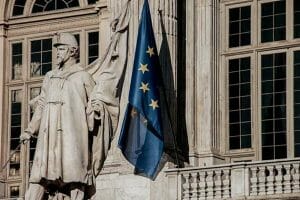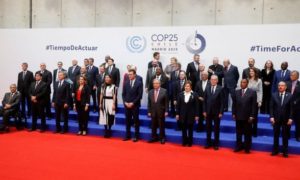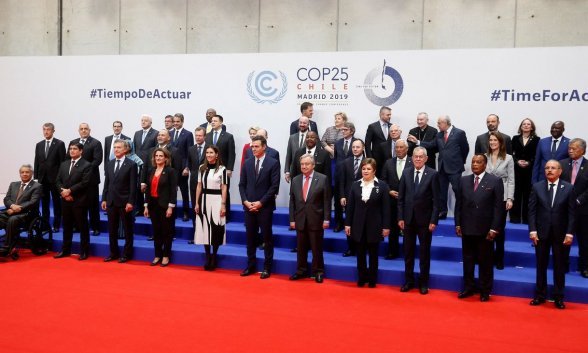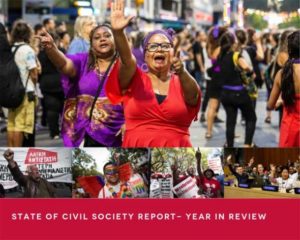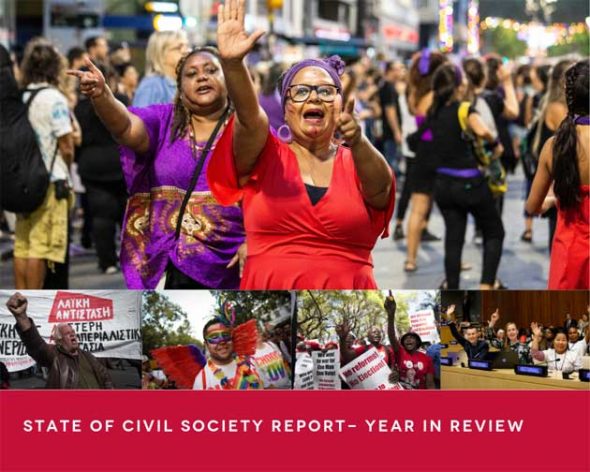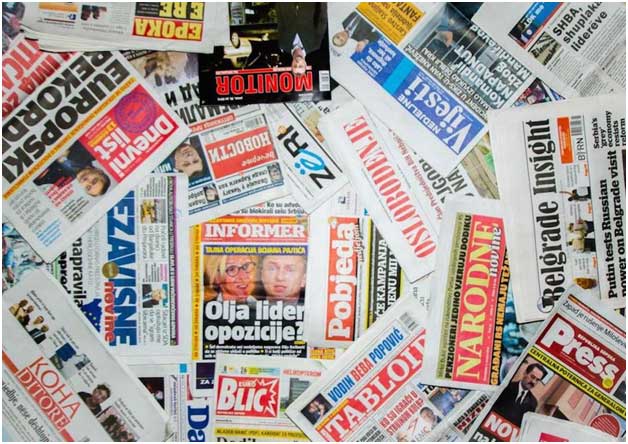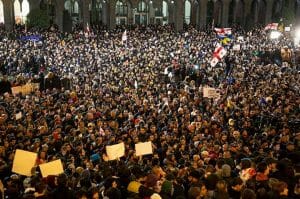

Cedit: Daro Sulakauri/Getty Images
By Andrew Firmin
LONDON, Mar 17 2023 (IPS)
Georgian civil society can breathe a sigh of relief. A proposed repressive law that would have severely worsened the space for activism has been shelved – for now. But the need for vigilance remains.
Russia-style law
A proposed ‘foreign agents’ law would have required civil society organisations (CSOs) and media outlets in Georgia receiving over 20 per cent of funding from outside the country to register as a ‘foreign agent’. Non-compliance would have been punishable with fines and even jail sentences.
The law’s proponents, including Prime Minister Irakli Garibashvili, claimed it was modelled on one passed in the USA in 1938. The US law was introduced to check the insidious spread of Nazi propaganda in the run-up to the Second World War, and wasn’t targeted at CSOs.
For civil society it was clear the source of inspiration was much more recent and closer to home: Russia’s 2012 law, since extended several times, which allows the state to declare a ‘foreign agent’ any person or organisation it judges to be under foreign influence. The law has been used extensively to stigmatise civil society and independent media. It’s been imitated by other repressive states looking for ways to stifle civil society.
In Georgia, as in Russia, the ‘foreign agent’ terminology is deeply suggestive of espionage and treachery. Any organisation it’s applied to can expect to be instantly viewed with suspicion. This meant the law would stigmatise CSOs and media organisations.
Alarmingly, the proposed law was no isolated event: the government has been ramping up the rhetoric about groups ‘opposing the interests of the country’ and the need to save Georgia from foreign influence.
The initial proposal for the law came from a populist political faction, People’s Power, that split from the ruling party, Georgian Dream, but works in coalition with it. People’s Power has a track record of criticising foreign funding, particularly from the USA, which it claims undermines Georgia’s sovereignty, and has accused CSOs and the main opposition party of being US agents.
CSOs insist they already adhere to high standards of accountability and transparency, making any further regulations unnecessary. They point to the vital role civil society has played over the years in establishing democracy in Georgia, providing essential services the state fails to offer and helping to introduce important human rights protections.
This work necessarily requires financial support, and since there are few resources within Georgia, that means foreign funding, including from the European Union (EU) and other international bodies – sources the government is also happy to receive funding from.
The power of protest
The scale of the reaction took the government by surprise. Many states around the world have enacted repressive civil society laws, and it’s often hard to get the public to take an interest. But the issue cut through because of the larger concerns many people have about Russian influence, heightened by the war on Ukraine.
Russia is an ever-present issue in Georgian politics. The two countries went to war in 2008, and two breakaway parts of Georgia – Abkhazia and South Ossetia – claim autonomy and receive heavy Russian support. Georgian Dream, founded by billionaire business tycoon Bidzina Ivanishvili, has an official policy of pragmatism towards Russia while also cultivating links with the EU – but opponents accuse it and People’s Power of being too close to Russia.
Many see the country’s future as lying within a democratic Europe and fear returning to Russia’s domination. This made the proposed law about a fundamental question of national identity.
That’s why, when parliament started discussing the bill in early March, thousands gathered over several nights, many waving Georgian and EU flags and chanting ‘no to the Russian law’.
When the bill passed its hurried first reading it sparked some violent clashes. Some people threw stones and the police responded disproportionately with teargas, stun grenades, pepper spray and water cannon. But people kept protesting and the government feared the situation could spiral out of its control. So, at least for the time being, it backed down.
What next?
The immediate threat may have passed, but it isn’t game over. The government hasn’t said the law was a bad idea, merely that it failed to explain it properly to the public and withdrew it to reduce confrontation.
Georgia was one of three countries that applied to join the EU following the start of Russia’s invasion of Ukraine. While the other two, Moldova and Ukraine, were quickly granted EU candidate status, Georgia wasn’t.
The EU cited the need for both economic and political reforms. This includes measures to reduce corruption, organised crime and oligarchic influence, improve the protection of human rights and enable civil society to play a stronger role in decision-making processes. In introducing the proposed law, the government took steps further away from the EU and made clear it doesn’t trust civil society.
This raises concerns the bill could return in some revised form, or other restrictions on civil society could be introduced. In numerous countries, the kind of verbal attacks on civil society recently made by the government have led to restrictions.
But Garibashvili should be more attentive to the message of the protests. By taking to the streets, people told the government they’re paying attention and disagree with its current direction – and forced it to back down. Civil society has shown its power, and deserves to be listened to rather than treated with suspicion.
Andrew Firmin is CIVICUS Editor-in-Chief, co-director and writer for CIVICUS Lens and co-author of the State of Civil Society Report.



